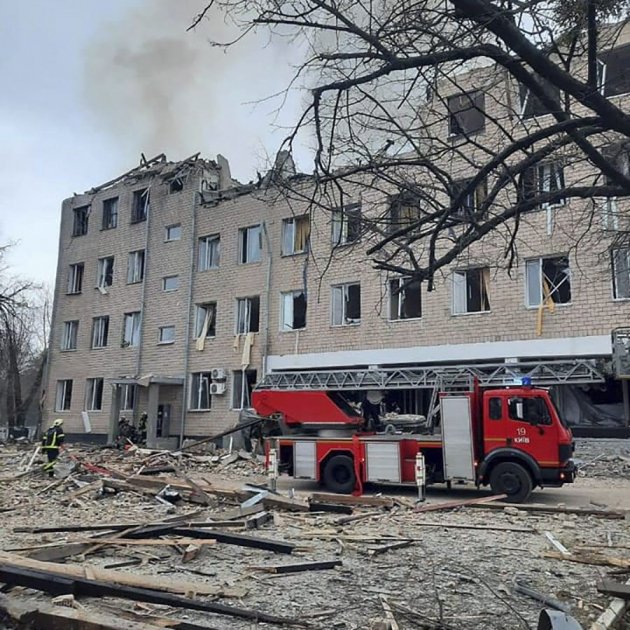The day the war began and, as many put it, the day the world changed: this Thursday morning began with the news that Russia had begun an invasion of Ukraine. The war feared for weeks was suddenly underway on a major scale and the international condemnation was general. The world came together to express opposition to the disastrous decision of Russian president Vladimir Putin to attack the neighbour whose land he considers his own. Catalonia, the Spanish state, France, Germany, the European Union, the United Kingdom, NATO, the USA, Canada, Turkey, the G7... With the exception of a few (like China), the major world powers aligned themselves in support of Ukraine and its people, thousands of whom began seeking refuge outside the cities and conflict zones. The international community imposed harsh sanctions on the Russians to force an end to hostilities, but Moscow's occupation forces are already at the gates of Kyiv. And along the way, they have left dozens dead and a humanitarian drama whose true scale is still unknown.
The advance of Putin's troops was rapid. The head of the Kremlin ordered the start of hostilities before 5am local time. As the attacks began, the first news of lives lost also arrived. Russia sent in troops from a number of points: from Crimea (occupied and assimilated into the Russian state in 2014), to the south; from the Donbass, to the east, the territory claimed since 2014 by the Russian-backed separatist republics of Donetsk and Lugansk; and from Russia's ally Belarus to the north. The president of Ukraine, Volodymyr Zelensky, had no choice but to impose martial law and hand out weapons to his people to defend themselves. At the same time, it appears that the Russians have not had struck many complications in advancing towards the Ukrainian capital. Many citizens of Kyiv were seen trying to evacuate - yielding images of long queues of traffic trying to leave the city. For those who have stayed in the country's main city, local authorities have declared a curfew and opened underground stations so that people can take refuge from the threat of airstrikes. Significant numbers have also headed for the borders of neighbouring nations, such as Romania, Moldova, Poland and Slovakia.
Guarantee the security of Donetsk and Lugansk
The first day of war is ending. The Russian defence ministry has said it has been a "success" after claiming to have eliminated more than 80 Ukrainian military installations in a kind of blitzkrieg. Although the Ukrainian military says it has destroyed a large number of Russian armoured vehicles, the reality is that Russia has virtually managed to encircle Kyiv and may be close to making a final thrust of its invasion plans. In the afternoon, president Zelenski announced that the occupying forces had taken control of a major aerodrome 35 kilometres from the capital. It was also reported that Putin's soldiers had occupied the Chernobyl nuclear power plant, given that passing through the radiation-affected exclusion zone is the easiest way to reach Kyiv. "The 1986 disaster must be avoided," said Zelenski in a tweet.
The Russian army has left many casualties in its path. Ukrainian authorities reported at around 6pm that more than 20 people had been killed in the Odessa region, fronting the Black Sea in the south. In addition, international organizations such as Amnesty International have denounced the killing of civilians in hospitals and residential blocks in the Donetsk region. This area is precisely the main "declared" goal of the Russian president: Putin says he wants to ensure the "security" of the Donetsk and Lugansk People's Republics, whose independence he recognized on Monday. In his early-morning pre-recorded speech, he literally spoke of "de-Nazifying" the country and "liberating" these regions. It is a kind of revenge against the US and NATO for refusing to abandon the idea of expanding the Atlantic Alliance to the east. That is, they had refused to reject the possibility of including Ukraine in NATO in the future. Towards the end of this first day of Putin's war, the Russian autocrat argued that he had no "alternative" but to invade Ukraine.
The harsh international backlash for Moscow
The condemnation of the start of the war was close to unanimous. In Catalonia, the government has set up an interdepartmental conflict monitoring group and has prepared refugee reception mechanisms. In Spain, Pedro Sánchez has assured that the European Union will do everything it can to "aid" Ukraine. In fact, the EU has applied tough new sanctions on Russia in an attempt to punish it for the hostilities against its neighbour: the new package of measures includes sanctions on 351 members of the Russian parliament and other key people and organizations. The United Kingdom has retaliated against private banks and a Russian airline. Finally, US president Joe Biden has limited Russian to doing business in dollars, euros, pounds and yen. Despite the harsh international response, there is one sanction that has not yet been implemented: the withdrawal of Russia from the SWIFT system, the most important electronic financial security network. At the moment, Germany is not clear that this is a good option.
Reactions against Putin have not only been international: there have been internal protests to try and stop the war. Many hundreds of those opposed to the war have taken to the streets of major Russian cities to attempt to assert their democratic right to protest. But the crackdown has not been long in coming and Russian police have begun arresting people. Some organizations report 600 arrests, although others say that the figure easily exceeds 800. In this regard, experts in geopolitics and international relations have explained that these kind of protests are key: a democratic opposition has to force changes on Russia to bring down Putin and get the country back on track. And that is what international sanctions are for - to wear down a country and open the door to democratic reforms.


